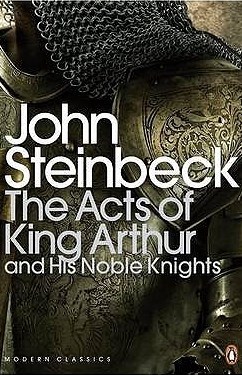Book review: The Acts of King Arthur and his Noble Knights by John Steinbeck

Don’t lend out the precious books of your childhood – at least, not if you expect to get them back. I can count on the fingers of one thumb the number of books that, having lent out, have been returned to me. Unfortunately, one of the books that I ‘lent’ was this one, in a fine hardback edition. I have no recollection to whom I lent it but, if you should happen to read this…I was going to say, please give it back. But now, that’s no longer necessary. For as memory turns back to the books that most formed me, I have started searching them out and rereading them.
The Acts of King Arthur and his Noble Knights was one of those books. I must have read it before I was ten and long, long before I read any other books by John Steinbeck. As a bookish teenager, I borrowed Of Mice and Men, The Grapes of Wrath and other Steinbeck novels from the school library (imagine having a school library that stocked such books!); impressive, immersive books, worthy of a Nobel-prize winner.
But none of them moved me – made me – as much as The Acts of King Arthur. Reading the introduction to this new edition, I learned that Steinbeck was given a copy of Malory’s Le Morte D’Arthur as a child. Rather than being repelled by the strange version of English in which it was written, he found it fascinating, relishing the aura of age and faerie that lay in the very words on the page, complementing the tales the words told.
As an adult, Steinbeck set about retelling Malory’s Arthurian legends but, sadly, he never completed the task. However, after his death, what he had written was published. It is remarkable. Undoubtedly the best retelling of these stories I have ever read. Steinbeck finds the language to set his stories in the same semi-legendary world in which Malory wrote, a world suspended between our own and the realm of quests and wizards and giants and dragons, a world where the temptations and virtues of chivalry are laid bare in a way that makes it, for a child such as me reading it, an invitation to emulate those virtues and follow those ideals.
It really is the most wonderfully written book but what sets it apart is the deep wisdom that supports the words on the page.
Having read Steinbeck’s version of Malory, I set about reading the original myself, both volumes in the old and much missed Everyman series. While I enjoyed the original, I must admit that I preferred – and prefer – Steinbeck’s retelling. If you’ve not read this book, do so. It will transport you but, more importantly, reading it will make you a better person.
0 Comments